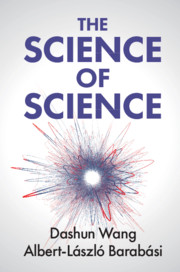Book contents
- The Science of Science
- The Science of Science
- Copyright page
- Dedication
- Contents
- Acknowledgements
- Introduction
- Part I The Science of Career
- Part II The Science of Collaboration
- 8 The Increasing Dominance of Teams in Science
- 9 The Invisible College
- 10 Coauthorship Networks
- 11 Team Assembly
- 12 Small and Large Teams
- 13 Scientific Credit
- 14 Credit Allocation
- Part III The Science of Impact
- Part IV Outlook
- Book part
- References
- Index
11 - Team Assembly
from Part II - The Science of Collaboration
Published online by Cambridge University Press: 07 February 2021
- The Science of Science
- The Science of Science
- Copyright page
- Dedication
- Contents
- Acknowledgements
- Introduction
- Part I The Science of Career
- Part II The Science of Collaboration
- 8 The Increasing Dominance of Teams in Science
- 9 The Invisible College
- 10 Coauthorship Networks
- 11 Team Assembly
- 12 Small and Large Teams
- 13 Scientific Credit
- 14 Credit Allocation
- Part III The Science of Impact
- Part IV Outlook
- Book part
- References
- Index
Summary
To provide a framework for understanding the importance of team assembly, we open the chapter with a story about teams of chickens. This leads into a discussion about the “too much talent” effect in a range of arenas. We then discuss the role that diversity plays in scientific teamwork. Studies show that diversity among team members – whether ethnic, international, or institutional – promotes the team’s effectiveness, with ethnic diversity offering the largest boost in impact of the resulting paper. We also define collective intelligence and explore that factors that lead to highly intelligent teams. Finally, by mapping the larger networks team members are involved in, we’ve identified four types of links that influence group effectiveness. By varying the proportion of these types of links within a network, we can see how certain coauthorship patterns will impact a team’s success. Taken together, these results show a strong correlation between a team’s composition and the quality of the work it produces. We end by discussing super-ties, or extremely close working relationships that become scientific partnerships, which yield surprising citation and productivity premiums.
Keywords
- Type
- Chapter
- Information
- The Science of Science , pp. 110 - 123Publisher: Cambridge University PressPrint publication year: 2021

